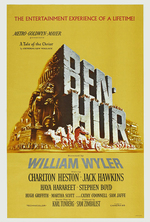Film Screening 31st August, 2013

Ben Hur
7:00 PM, 31st August, 2013
- PG
- 212 mins
- 1959
- William Wyler
- Karl Tunberg
- Charlton Heston, Jack Hawkins, Haya Harareet, Stephen Boyd
If Stanley Kubrick had never lived, I think William Wyler would be the next best thing. The two men had the same gift for making us feel that, whatever was ostensibly happening on screen, the fate of nations hung in the balance. They also made one Ancient Roman epic each (within a year of each other), and they’re the only two Roman epics I could unreservedly recommend to anyone.
Wyler’s epic, Ben-Hur, is of all movies ever made, the most likely to be called ‘big’. It’s not merely long: it covers a lot of ground, and we see our titular hero (Charlton Heston – perfect casting) as a Judean prince, then slave, then Roman aristocrat – then more. The territory is big (half the Mediterranean), the sets are big, the music is big, the cast is big, the themes are big. The novel, a blockbuster bestseller in 1880, is subtitled “A Tale of the Christ” (as is an earlier version of the movie, made in 1925) – Ben-Hur is a contemporary of Jesus, and every so often runs into him. Unlike the book and earlier film, Wyler doesn’t overplay this bit: he realises that what’s really going on is a struggle within the hero between his nobler impulses and his need for revenge (like in The Count of Monte Cristo, but without the fashionable French cynicism).
And, as everyone knows, the biggest bit is the chariot race: nine nail-biting minutes in which, however many times you’ve seen it before, you’re never quite sure if Ben-Hur will survive, or who will next be trampled to death by a horse.
Henry Fitzgerald